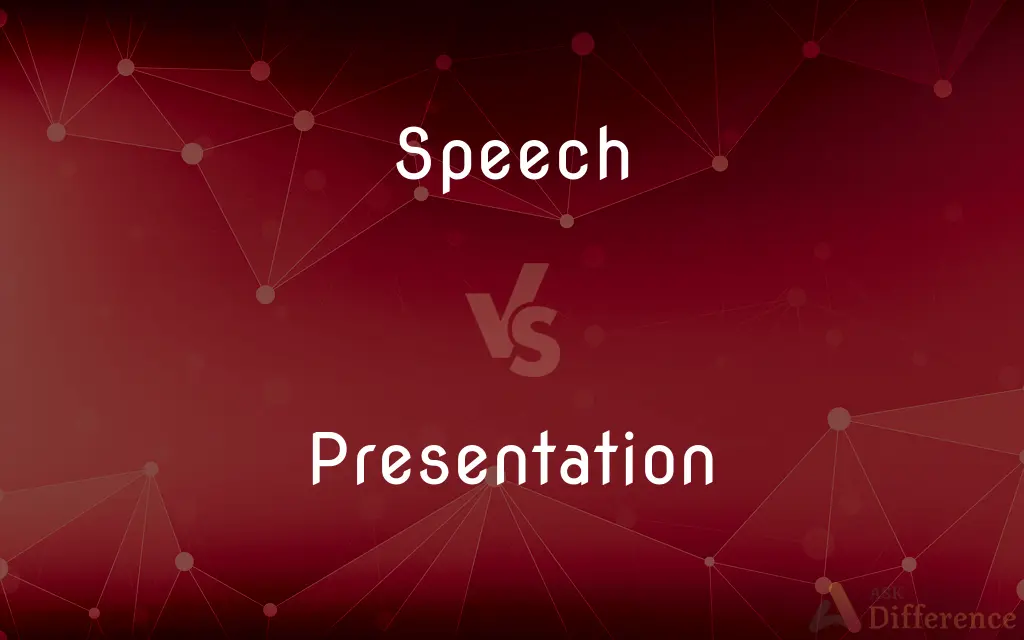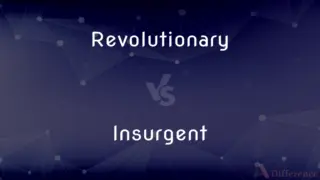Speech vs. Presentation — What's the Difference?
By Urooj Arif & Fiza Rafique — Updated on March 27, 2024
Speech is a formal address or discourse delivered to an audience, focusing on verbal expression, while a presentation integrates speech with visual aids or multimedia to convey information.

Difference Between Speech and Presentation
Table of Contents
ADVERTISEMENT
Key Differences
A speech primarily revolves around the spoken word, delivered by a speaker to communicate ideas, persuade, inform, or entertain an audience. It relies heavily on the speaker's ability to use language effectively, vocal delivery, and engagement techniques to connect with the audience. On the other hand, a presentation often encompasses not only the spoken component but also visual aids, such as slides, charts, videos, and other multimedia elements, to support and enhance the verbal message.
While a speech may occur in various contexts, from formal ceremonial occasions to informal gatherings, its success is largely dependent on the orator's verbal communication skills, including articulation, intonation, and pacing. Presentations, however, extend beyond the verbal to include the strategic use of visual and sometimes interactive elements, aiming to enhance comprehension, retention, and engagement through a more diversified approach to communication.
In crafting a speech, the speaker focuses on structuring their message, employing rhetorical devices, and possibly memorizing content or speaking extemporaneously with or without brief notes. Contrastingly, in preparing a presentation, the presenter must also consider the design and flow of visual aids, the integration of data and evidence through graphics, and the use of technology to project these aids effectively to the audience.
Speeches are often seen as a way to convey personal thoughts, beliefs, or arguments, creating an intimate connection with the audience through direct communication. Meanwhile, presentations can be more informative and educational, serving as a medium to disseminate knowledge, report findings, or introduce new ideas, where the visual components play a critical role in clarifying and emphasizing points.
The evaluation of a speech versus a presentation can differ significantly. A speech is typically judged on the clarity of its message, the effectiveness of its delivery, and the emotional impact on the audience. A presentation's success, however, also includes the effectiveness of visual aids, the clarity of data presentation, and the seamless integration of technology and verbal narration.
ADVERTISEMENT
Comparison Chart
Primary Focus
Verbal expression and engagement.
Integration of speech with visual aids or multimedia.
Skills Required
Oratory skills, command of language, engagement techniques.
Oratory skills, visual design, technical proficiency.
Purpose
To persuade, inform, entertain, or inspire.
To inform, educate, persuade, or report, using a multimedia approach.
Evaluation Criteria
Clarity of message, delivery, audience impact.
Effectiveness of verbal and visual communication, audience engagement.
Components
Spoken words, possibly supported by minimal notes.
Spoken words, visual aids (slides, charts, videos), possibly interactive elements.
Compare with Definitions
Speech
A formal address delivered to an audience.
The president gave a speech on national policy.
Presentation
A talk, often involving visual aids, given to convey information or teach.
The professor's presentation on ancient history was captivating.
Speech
An act of speaking publicly.
His speech at the conference was well-received.
Presentation
The preparation and display of visual aids to support a talk.
The presentation included graphs and charts for clarity.
Speech
A personal expression of ideas or opinions.
Her farewell speech was moving and memorable.
Presentation
A session aimed at educating or informing an audience with the help of multimedia.
The webinar featured a presentation on digital marketing strategies.
Speech
A discourse intended to persuade or inspire.
The motivational speech encouraged many to take action.
Presentation
The act of presenting information in a structured format.
Her presentation at the meeting outlined the project's next steps.
Speech
The ability to express thoughts and feelings by articulate sounds.
The child's speech has improved significantly.
Presentation
A demonstration or display of a product or idea.
The company held a presentation for its new software.
Speech
Speech is human vocal communication using language. Each language uses phonetic combinations of vowel and consonant sounds that form the sound of its words (that is, all English words sound different from all French words, even if they are the same word, e.g., "role" or "hotel"), and using those words in their semantic character as words in the lexicon of a language according to the syntactic constraints that govern lexical words' function in a sentence.
Presentation
A presentation conveys information from a speaker to an audience. Presentations are typically demonstrations, introduction, lecture, or speech meant to inform, persuade, inspire, motivate, build goodwill, or present a new idea/product.
Speech
The expression of or the ability to express thoughts and feelings by articulate sounds
He was born deaf and without the power of speech
Presentation
The action of presenting something
The presentation of awards.
Speech
A formal address or discourse delivered to an audience
He gave a speech about the company
Presentation
The style or manner with which something is offered for consideration or display
"These truths are not amenable to scientific presentation" (Karen Armstrong).
Speech
The faculty or act of speaking.
Presentation
A theatrical or cinematic production.
Speech
The faculty or act of expressing or describing thoughts, feelings, or perceptions by the articulation of words.
Presentation
A demonstration, lecture, or speech
Gave a presentation on drug abuse.
Speech
What is spoken or expressed, as in conversation; uttered or written words
Seditious speech.
Presentation
A formal introduction of someone to others, as at court.
Speech
A talk or public address, or a written copy of this
The senator gave a speech.
Presentation
(Ecclesiastical) The act or right of naming a cleric to a benefice.
Speech
The language or dialect of a nation or region
American speech.
Presentation
The position of the fetus in the uterus at birth with respect to the mouth of the uterus.
Speech
One's manner or style of speaking
The mayor's mumbling speech.
Presentation
A symptom or sign or a group of symptoms or signs that is evident during a medical examination
The patient's presentation was consistent with a viral illness.
Speech
The study of oral communication, speech sounds, and vocal physiology.
Presentation
The fact of being evident or manifest. Used of a disease or condition
The presentation of thyroid disease during pregnancy.
Speech
(uncountable) The ability to speak; the faculty of uttering words or articulate sounds and vocalizations to communicate.
He had a bad speech impediment.
After the accident she lost her speech.
Presentation
The act of presenting, or something presented.
Speech
(uncountable) The act of speaking, a certain style of it.
Her speech was soft and lilting.
Presentation
A dramatic performance.
Speech
(countable) A formal session of speaking, especially a long oral message given publicly by one person.
The candidate made some ambitious promises in his campaign speech.
Presentation
An award given to someone on a special occasion.
Speech
(countable) A dialect, vernacular, or (dated) a language.
Presentation
Money given as a wedding gift.
Speech
(uncountable) Language used orally, rather than in writing.
This word is mostly used in speech.
Presentation
A lecture or speech given in front of an audience.
Speech
(grammar) An utterance that is quoted; see direct speech, reported speech
Presentation
(medicine) The symptoms and other possible indications of disease, trauma, etc., that are exhibited by a patient who has sought, or has otherwise come to, the attention of a physician.
The presentation of the thirty-four-year-old male in the emergency room was slight fever, dilated pupils, and marked disorientation.
Speech
(uncountable) Public talk, news, gossip, rumour.
Presentation
(medicine) The position of the foetus in the uterus at birth.
Speech
To make a speech; to harangue.
Presentation
(mainly LGBT) Gender presentation; gender expression.
Speech
The faculty of uttering articulate sounds or words; the faculty of expressing thoughts by words or articulate sounds; the power of speaking.
There is none comparable to the variety of instructive expressions by speech, wherewith man alone is endowed for the communication of his thoughts.
Presentation
(fencing) Offering one's blade for engagement by the opponent.
Speech
He act of speaking; that which is spoken; words, as expressing ideas; language; conversation.
O goode God! how gentle and how kindYe seemed by your speech and your visageThe day that maked was our marriage.
The acts of God . . . to human earsCan nort without process of speech be told.
Presentation
(mathematics) The specification of a group by generators and relators.
Speech
A particular language, as distinct from others; a tongue; a dialect.
People of a strange speech and of an hard language.
Presentation
The act or right of offering a clergyman to the bishop or ordinary for institution in a benefice.
Speech
Talk; mention; common saying.
The duke . . . did of me demandWhat was the speech among the LondonersConcerning the French journey.
Presentation
(immunology) The preparation of antigen fragments during the immune response.
Speech
Formal discourse in public; oration; harangue.
The constant design of these orators, in all their speeches, was to drive some one particular point.
Presentation
The act of presenting, or the state of being presented; a setting forth; an offering; bestowal.
Prayers are sometimes a presentation of mere desires.
Speech
Ny declaration of thoughts.
I. with leave of speech implored, . . . replied.
Presentation
Exhibition; representation; display; appearance; semblance; show.
Under the presentation of the shoots his wit.
Speech
To make a speech; to harangue.
Presentation
That which is presented or given; a present; a gift, as, the picture was a presentation.
Speech
The act of delivering a formal spoken communication to an audience;
He listened to an address on minor Roman poets
Presentation
The act of offering a clergyman to the bishop or ordinary for institution in a benefice; the right of presenting a clergyman.
If the bishop admits the patron's presentation, the clerk so admitted is next to be instituted by him.
Speech
(language) communication by word of mouth;
His speech was garbled
He uttered harsh language
He recorded the spoken language of the streets
Presentation
The particular position of the child during labor relatively to the passage though which it is to be brought forth; - specifically designated by the part which first appears at the mouth of the uterus; as, a breech presentation.
Speech
Something spoken;
He could hear them uttering merry speeches
Presentation
The activity of formally presenting something (as a prize or reward);
She gave the trophy but he made the presentation
Speech
The exchange of spoken words;
They were perfectly comfortable together without speech
Presentation
The act of making something publicly available; presenting news or other information by broadcasting or printing it;
He prepared his presentation carefully in advance
Speech
Your characteristic style or manner of expressing yourself orally;
His manner of speaking was quite abrupt
Her speech was barren of southernisms
I detected a slight accent in his speech
Presentation
A show or display; the act of presenting something to sight or view;
The presentation of new data
He gave the customer a demonstration
Speech
A lengthy rebuke;
A good lecture was my father's idea of discipline
The teacher gave him a talking to
Presentation
The act of presenting a proposal
Speech
Words making up the dialogue of a play;
The actor forgot his speech
Presentation
A visual representation of something
Speech
The mental faculty or power of vocal communication;
Language sets homo sapiens apart from all other animals
Presentation
Formally making a person known to another or to the public
Presentation
(obstetrics) position of the fetus in the uterus relative to the birth canal;
Cesarean sections are sometimes the result of abnormal presentations
Common Curiosities
Why is audience engagement important in both speeches and presentations?
Engagement keeps the audience interested, makes the message more memorable, and can influence their response or actions.
How can one improve their speech delivery?
Practice, understanding the audience, refining the message, and improving vocal delivery and body language can enhance speech delivery.
Are there different types of speeches?
Yes, including informative, persuasive, ceremonial, and motivational speeches.
What is the main difference between a speech and a presentation?
A speech focuses on verbal communication, while a presentation combines speech with visual aids.
How do visual aids enhance a presentation?
Visual aids can clarify complex information, engage the audience, and support the verbal message.
Is public speaking the same as giving a speech?
Yes, public speaking often involves giving a speech to an audience.
How do you organize a speech?
By structuring it with an introduction, body, and conclusion, and focusing on clear, concise points.
What makes a presentation memorable?
A clear message, engaging visual aids, a confident delivery, and the ability to connect with the audience.
Can a speech include visual aids?
Yes, but its focus remains on verbal delivery, and visual aids, if any, play a minimal role.
Can a presentation be effective without visual aids?
While possible, visual aids significantly enhance the effectiveness of a presentation by supporting and illustrating the verbal message.
What technology is commonly used in presentations?
Projectors, computers, presentation software (like PowerPoint), and sometimes interactive whiteboards.
What role does storytelling play in speeches and presentations?
Storytelling can make the content more relatable, engaging, and memorable.
Can a presentation be interactive?
Yes, many presentations involve audience participation or use interactive technology to engage the audience.
How important is the closing of a speech or presentation?
Very important; it reinforces the message, summarizes key points, and leaves a lasting impression on the audience.
How can feedback improve a speech or presentation?
Feedback can offer insights into the effectiveness of delivery, clarity of message, and areas for improvement.
Share Your Discovery

Previous Comparison
Mall vs. Outlet
Next Comparison
Revolutionary vs. InsurgentAuthor Spotlight
Written by
Urooj ArifUrooj is a skilled content writer at Ask Difference, known for her exceptional ability to simplify complex topics into engaging and informative content. With a passion for research and a flair for clear, concise writing, she consistently delivers articles that resonate with our diverse audience.
Co-written by
Fiza RafiqueFiza Rafique is a skilled content writer at AskDifference.com, where she meticulously refines and enhances written pieces. Drawing from her vast editorial expertise, Fiza ensures clarity, accuracy, and precision in every article. Passionate about language, she continually seeks to elevate the quality of content for readers worldwide.
















































